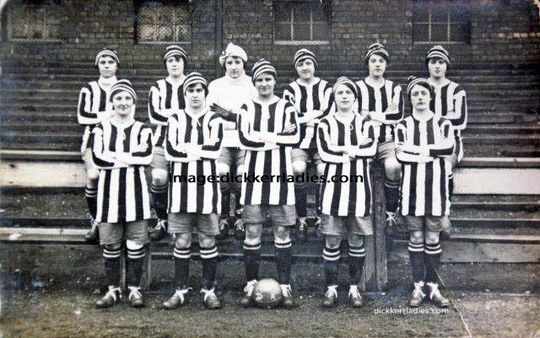Kicking Off
Kicking Off
The Dick, Kerr Ladies were formed at a munitions factory in Preston during the First World War. Named after its two Scottish founders, William Bruce Dick and John Kerr, set up a factory on Strand Road,
Preston in 1898. Dick, Kerr & Co Ltd was originally a tramway rolling stock and electrical works. This formed the nucleus of the traction works at Preston and the company became the leading British firm for the traction industry and were responsible for the electrification of railway from Liverpool to Southport in 1904.
The country was desperately short of ammuniton at the outbreak of the First World War in 1914. The Admiralty and War Office approached the Dick, Kerr Company to undertake the manufacture of shells for both Armed Services and the whole of the works equipment had to be replaced. The first batch of shells were bonded in 1915 and this was the start of an output of missiles that reached 30,000 a week during the War period.
While young men in their thousands from all across the land answered Lord Kitcheners patriotic call to rally round the flag, with his slogan, 'Your Contry Needs You', women were also needed on the home front to help keep the War machine alive. Women became the nations hidden army as they took on every conceivable task to keep the home fires burning and help the country win the War.
The work undertaken by women was long and hard and often extremely dangerous. From operating complicated machinery to working on the land, there was nothing that women didn't do to keep the supply chain in full throttle. They worked as mechanics, bus drivers, in industry, and could even be seen lugging huge sacks of coal from the mines on their backs, there was literally no occupation that wasn't undertaken by women. Those working on heavy machinery would sometimes get caught up in it, many women lost part, if not all, of their hair and sometimes even their scalps. Those working in the aircraft industry could be severely affected by the highly toxic chemicals used to waterproof the aircraft and they would suffer side effects ranging from headaches, nausea, fainting, and sometimes even death.
Those women who worked in munitions became known as Munitionettes. They were exposed to dirty and dangerous conditions involving the use of toxic chemicals and heavy machinery and often put their lives on the line. The most visible side effect of munitions work could be seen by those women who had the task of filling shells with TNT. This highly explosive and poisonous chemical caused the hair and skin of the workers to turn yellow, and this was a visible sign of toxic jaundice and earned them the nickname 'Canaries'. There was no treatment for TNT poisoning, they just had to wait and see if they recovered.
As you can see, the munitionettes didn't have an easy time of it, but in spite of the difficulties, women were empowered by the War. They may have lost husbands, sons and brothers, but despite their devastating loss, they found a new self confidence from being thrown into these extremely challenging times, and proved that they could more hold their own in any situation. But with thousands of munitions girls being drafted into towns and cities, it became obvious that after work activities needed to be arranged to keep them occupied and pevent public disorder. The government appointed female welfare supervisors and sent them into the factories to oversee the moral and physical well being of the girls and they also encouraged the development of sporting activities.
It might come as a surprise to learn, that among the many recreational activities arranged for them was football, and football became the official sport of munitions girls. Almost every factory across the UK involved in War work, had a ladies football team, many may have only played against other departments with their own factory, but teams were recorded from one end of the country to the other.
Ladies playing football was not a new phenomenon. One of the best documented matches took place in 1895 at Crouch End Athletic Ground in London. The British Ladies Football Club was formed by middle class feminist Nettie Honeyball who arranged for the match to take place between teams from the north and south of London in March that year and they went on to play other matches around the country before going into decline.
During the First World War, the idea of ladies playing football for charity was springing up all over the country and games were being organised to raise funds for many worthy causes during such a difficult time in our history. But it was in Preston, where the most successful team in the history of women's football, was born. Formed at Dick, Kerr & Co Ltd, these very ordinary factory girls would quite literally take the country by storm.
Their incredible journey had its humble beginings in the factory yard. During their tea-breaks and lunch times, the munitions girls would often join in with the young apprentices while they were having a kick-about. A regular member of these friendly games was Grace Sibbert, and Grace was always game for a laugh. It was October 1917 and the lads football team had been having a run of bad results, losing several of their recent games. They had suffered quite a heavy defeat that weekend and the girls were giving the lads some stick in the works canteen saying that they could play better than them. The lads were having none of it so they challenged the girls to prove their skills in a proper match. Grace accepted immediatley and said, 'come on girls, let's give it a go, it'll be a laugh', and the arrangments were made for it to take place in the Penwortham area, not too far from the factory. The result of the game is not known but the girls were soon to continue with their newly formed football team.
The Matron of the Moor Park Military Hospital, approached the factory to ask if the girls would help with their fundraising activities for the wounded soldiers in the run up to Christmas, and suggested a charity concert might be a good idea. The girls were only too happy to offer their services, but thought a charity football match might be a better idea. The arrangements were duly made, and on Christmas Day 1917, the newly formed Dick, Kerr Ladies football team took on the neighbouring Arundel Coulthard Foundry in a charity football match. No one could have imagined the success it would turn out to be.
10,000 people came to Deepdale, the home of Preston North End, to witness the start of the most phenomenal success story in the history of women's sport. Dick, Kerr Ladies notched up the first of many famous victories, and £600 (almost £50k today) was raised for the wounded soldiers.
Never in their wildest dreams could they have ever imagineed the journey they were about to undertake.
Imagine England beating France on French soil by 2-0 and the victorious players being carried shoulder high off the pitch by their adoring fans. Imagine playing in front of 53,000 spectators. Imagine having a run of over 200 games without defeat. Imagine having the leading goal-scorer of all time. Imagine Sir Matt Busby saying that one of your players was the best he had ever seen and would have signed them for Manchester United there and then if she had been male. None of this is make-believe, every word is true!
By 1921 the popularity of the Dick, Kerr Ladies was at its height they were the team that everyone wanted to see and they had been booked to play an average of two games a week all over the UK. They played in excess of sixty games of football that year, while still working full time at the factory, and a staggering number of almost 900,000 people came to watch them. But storm clouds were gathering and by the end of the year, women's football would be seen in a very different light.
On 5 December 1921, the FA banned ladies football and instructed all member clubs to refuse permission of their grounds for ladies matches. It was a bitter blow for all concerned and many teams did fall by the wayside, but the Dick, Kerr Ladies continued playing football against all adversity until 1965. This is what makes them special and unique. After such a crushing blow by the FA, the Dick, Kerr Ladies never gave up and continued against all the odds.
In 1922 the travelled across the Atlantic to play a series of matches but didn't know until they arrived that they would have to play against men. They did so with their usual skill and determination and won the hearts of the American people.
The continued playing throughout the 1920s and 1930s and claimed to be World Champions. In 1937 they were challenged to this title by Edinburgh Ladies. They accepted the challenge and won the match by 5-1 and the press acknowledged them as Champions.
Put on hold during the Second World War, the team was reformed as soon as the hostilites were over. The first post war fixture was played at Glossop on Good Friday 1946. In the mid 1950s, long serving manager Alfred Frankland became ill and most of the secretarial duties were taken over by Kath Latham. Alfred Frankland died in 1957, and Kath took over the full time role of manager of the Dick, Kerr Ladies. They continued playing until 1965 but were sadly forced to disband due to a lack of players.
In 1966 England won the World Cup and football mania swept the country and there was no shortage of girls wanting to take up the game. But it was just too late for the Dick, Kerr Ladies. The Women's Football Association was formed in 1969 and the FA finally rescinded their ban some fifty years after they had first imposed it. The WFA was wound up in 1993 when the FA took over the future development of the women's game.
It has been a long struggle, but finally today, the history of women's football is at last being appreciated. Things are moving in the right direction, women's football is on the rise and hopefully has a long and successful future in front of it. But you don't really know where you're going, unless you know where you're from. Hopefully by learning how great we once were, can we aspire to be as great again.

